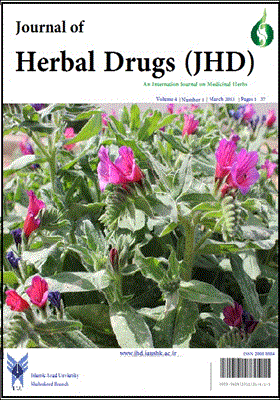Using elicitors for enhanced production of secondary metabolites in plant cell and organ suspension cultures
محورهای موضوعی : مجله گیاهان دارویی
مریم محمدی فارسانی
1
,
عبدالله قاسمی پیربلوطی
2
![]()
1 - دانشگاه پیام نور تهران شرق، ایران
2 - مرکز پژوهش های گیاهان دارویی و دام پزشکی سنتی، دانشگاه آزاد اسلامی واحد شهرکرد، شهرکرد، ایران
کلید واژه: elicitor, Secondary metabolites, signaling pathway, Plant Cell Culture,
چکیده مقاله :
In biotechnology has been concentrated to review alternative routes for the production of natural compounds. Plant cell culture systems are viable alternatives for the production of secondary metabolites that are of commercial importance in food and pharmaceutical industries. However, relatively very few cultures synthesize these compounds over extended periods in amounts comparable to those found in whole plants. Various strategies have been employed to increase the production of secondary metabolites in cell cultures. These include manipulation of culture media (hormonal and nutrient stress) and environmental conditions (temperature, pH and osmotic stress), precursor addition, elicitation and combination of these strategies. Nowadays, genetic manipulation of biosynthetic pathways by metabolic engineering has also become a powerful technique for enhanced production of desired metabolites. Studies have shown that both biotic and abiotic elicitors synthesis of secondary metabolites increases in plant cell culture medium.
در زیست فناوری همواره به بررسی مسیرهای جایگزین برای تولید ترکیبات طبیعی توجه میشود. سیستمهای کشت سلول و اندام گیاهی برای تولید متابولیت های ثانویه ای که اهمیت تجاری در صنایع غذایی و دارویی دارند قابل جایگزینی میباشند. با این حال، تقریباً تعداد کمی از محیطهای کشت این ترکیبات را سنتز میکنند و میزان این سنتز و مدت زمانی که صرف میکند قابل مقایسه با استفاده از یک گیاه کامل میباشد. روشهایی شامل تغییر محیط کشت (افزودن مواد مغذی و هورمونی) و شرایط محیطی (تغییرات دما، pH و اسمزی) و همین طور از مواد استخراجی و ترکیبی نیز در این راهبردها استفاده می شده است. امروزه از دستکاری ژنتیکی مسیرهای بیوسنتتیک با استفاده از مهندسی متابولیکی که امروزه برای بهبود تولیدات متابولیت های مورد نیاز تکنیکی قدرتمند شده است استفاده میشود. نتایج مطالعات انجام شده نشان میدهد که هم الیسیتورهای زیستی و هم غیر زیستی سنتز متابولیتهای ثانویه را در محیط کشت سلولهای گیاهی افزایش میدهند.
Bonfante, P. 2009. Symbiotic fungi: principles and practice. vol. 18. Springer Heidelberg Dordrecht London New York. pp 373
Bourgaud, F., Gravot, A., Milesi, S. and Gontier, E. 2001. Production of plant secondary metabolites: a historical perspective. Plant Science, 161: 839-851.
Box, G.E.P. 1945. The exploration and exploitation of response surfaces: some general considerations and examples. Biometrics, 10: 16-60.
Dixon, R.A. 2001. Natural products and plant disease resistance. Nature, 411(6839): 843-847.
Hadimani, S.B., Tanpure, R.P. and Bhat, S.V. 1996. Asymmetric total synthesis of (-) Podophyllotoxin. Tetrahedron Lett, 37: 4791–4794.
Imbert, F. 1998. Discovery of podophyllotoxins. Biochimie, 80: 207-222.
Li, J., Ou-Lee, T.M., Raba, R., Amundson, R.G. and Last, R.L. 1993. Arabidopsis mutants are hypersensitive to UV-B radiation. Plant Cell, 5: 171–179.
Oksman-Caldentey, K. M., and Inze, D., 2004. Plant cell factories in the post-genomic era: new ways to produce designer secondary metabolites. Trends Plant Sci, 9: 433-440.
Patel, H. and Krishnamurthy, R. 2013. Elicitors in Plant Tissue Culture. Pharmacognosy and Phytochemistry, 2: 60-65.
Pichersky, E. and Gang, D.R. 2000. Genetics and biochemistry of secondary metabolites in plants: an evolutionary perspective. Trends in plant science, 5: 439-445.
Rao, R.S. and Ravishankar, G.A. 2002. Plant tissue cultures; chemical factories of secondary metabolites. Biotechnol, 20: 101-153.
Stahelin, H.F. and Wartburg, A.V. 1991. The chemical and biological route from podophyllotoxin glucoside to etoposide. Cancer Res, 51: 5-15.
Vasconsuelo, A. and Boland, R. 2007. Molecular aspects of the early stages of elicitation of secondary metabolites in plants. Plant Sci, 172: 861-875.
Wink, M., Alfermann, A.W., Franke, R., Wetterauer, B., Distl, M., Windhovel, J., Krohn, O., Fuss, E., Garden, H., Mohagheghzaden, A., Wildi, E. and Ripplinger, P. 2005. Sustainable bioproduction of phytochemicals by plant in vitro cultures: anticancer agents. Plant Genetic Resour, 3: 90-100.
Zhao, J., Davis, L.C. and Verpoorte, R. 2005. Elicitor signal transduction leading to production of plant secondary metabolites. Biotechnol Adv, 23: 283-333.
Zhoua, L.G. and Wu, J.U. 2006. Development and application of medicinal plant tissue cultures for production of drugs and herbal medicinals in China. Nat Prod Rep, 23: 789–810.


